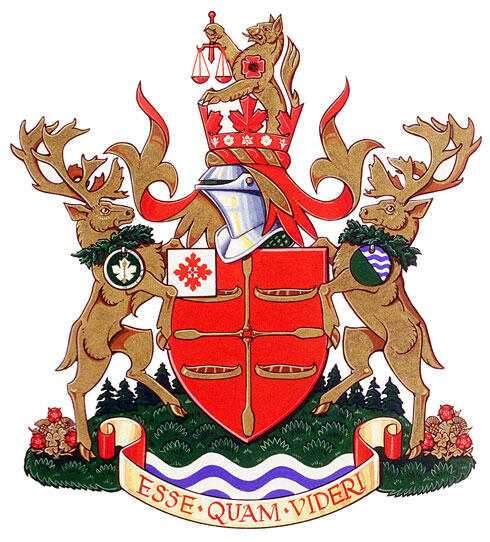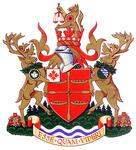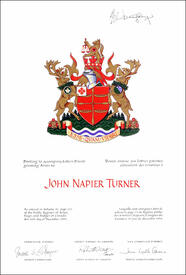The contents of this Register are intended for research purposes only. The heraldic emblems found in the Register may not be reproduced in any form or in any media without the written consent of the Canadian Heraldic Authority and/or the recipient.
Toronto, Ontario
Grant of Arms and Supporters
December 15, 1994
Vol. II, p. 277
Arms of John Napier TurnerBlazonGules four canoe paddles their handles conjoined in cross between four canoes Or on a canton the mark of the Prime Ministership of Canada (Argent four maple leaves conjoined in cross at the stem Gules); SymbolismThe canoes and paddles refer to Mr. Turner’s love of canoeing. Their number represents his four children. The cross of paddles, indicating the four compass points, alludes to his service to all Canadians. The heraldic emblem of the Prime Minister of Canada appears in the upper left corner. |
CrestBlazonIssuant from a coronet érablé Gules the rim bearing a frieze of alternating dogwood lily and trillium flowers all Argent a demi wolf Or charged on each shoulder with a poppy Gules seeded Sable and bearing in the dexter forepaw an ansul Gules; SymbolismThe coronet combines the maple leaf with the provincial flowers of Quebec, Ontario and British Columbia, recalling Mr. Turner’s representation of ridings in those three provinces over the course of his parliamentary career. The wolf, an animal of power and swiftness, refers to the rich natural heritage of the Canadian North. The scales of justice symbolize Mr. Turner’s profession as a lawyer. The poppy indicates Mrs. Turner’s family roots in Guelph, Ontario. Guelph’s heraldic badge includes a poppy to refer to the poem “In Flanders Fields”, written by Guelph native John McRae, Mrs. Turner’s great-uncle. |
MottoBlazonESSE QUAM VIDERI; SymbolismThis Latin phrase means “To be rather than to seem”. |
SupportersBlazonOn a grassy mound rising above barry wavy Argent and Azure set between two stems growing thereon roses Gules thistles and shamrocks Or and standing in front of river cedar trees Vert dexter a caribou buck Or gorged with a collar of river cedar branches Vert pendant therefrom the badge of a member of the House of Commons of Canada sinister a caribou doe Or gorged with a like collar pendant therefrom a medallion per bend barry wavy Azure and Argent and Vert; SymbolismThe caribou represent the riches of the northern wilderness. The river cedar around their necks and in the compartment refers to the northern landscape. The buck’s medallion is the pin worn by the members of the House of Commons. The doe’s medallion evokes the phrase “north of 60”, combining references to the tree line and northern lakes and rivers. The wavy blue and white bars represent the waters of these northern rivers as well as the St. Lawrence River, Lake Ontario and English Bay in Vancouver, near where Mr. Turner has resided. The compartment included two composite plants honouring Mr. Turner’s English (rose), Scots (thistle) and Irish (shamrock) ancestry. |
Additional InformationCreator(s)Original concept of Robert D. Watt, Chief Herald of Canada, assisted by the heralds of the Canadian Heraldic Authority. PainterLinda Nicholson CalligrapherNancy Ellis Recipient TypeIndividual Special DesignationPrime Minister |




